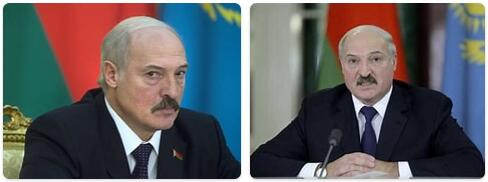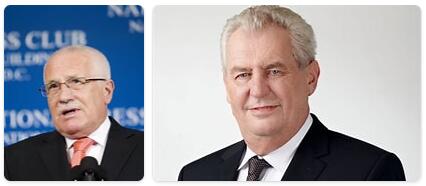Belarus Government and Politics
State and politics

Belarus declared itself independent on August 25, 1991. Until 1994, the country was ruled by the parliament, the Supreme Soviet, which was elected in 1990, while Belarus was still part of the Soviet Union. Aljaksandr Lukashenka then in a short time created a profile by leading an anti-corruption commission in parliament and accusing some 70 prominent people, including the first head of state, Supreme Soviet President Stanislav Shushchevich (born 1934); this was later cleansed from the charges.
Shortly thereafter, in March 1994, a new constitution was adopted which introduced a presidential office with great powers. In the same year, Lukashenka was elected as the country’s president with the support of more than 80 percent of the votes in the second round. The presidential power has subsequently been further strengthened by constitutional amendments in 1995 and 1996. A new constitutional revision in 2004 removed all restrictions regarding the president’s term of office.
The powers of the President are extensive. The president is head of state and is elected for five years in direct elections. The President is responsible for the security and sovereignty of the state, appoints the head of government and ministers, appoints judges, heads the National Security Council and is the commander-in-chief of the armed forces. In practice, the head of state controls the entire apparatus of power, and his decree has the status of law which does not have to be approved by Parliament.
The first parliamentary elections since the country became independent were held in 1995. Because of the electoral law’s demands for an absolute majority, not all seats in parliament could be filled. Lukashenka then announced a referendum to replace the old Soviet parliament with a new two-chamber parliament. The first chamber, the Republican Council, which formally appoints the country’s highest officials, consists of 64 people who are partially appointed by the president himself. The second chamber, the directly elected House of Representatives, has 110 members. Most MPs lack party affiliation. The parliamentary elections 2000, 2004, 2008, 2012, 2016 and 2019, and the 2001, 2006, 2010 and 2015 presidential elections have been judged by international observers.
Some of Lukashenka’s foremost political challengers have disappeared without a trace and are no longer believed to be alive. Viktor Hantjar, former Deputy Prime Minister and Chairman of the Central Election Commission, disappeared in 1999 along with businessman Anatoly Krasovsky. The same fate hit the former Interior Minister Yuriy Zacharenko. Prior to the 2006 presidential election, candidate Aljaksandr Kazulin was beaten and subsequently sentenced to five and a half years in prison. After the 2010 presidential election, candidate Andrei Sannikov was sentenced to five years in prison.
International relations
Lukashenka’s power holdings have also been characterized by a strong Prorian policy. In May 1995, Lukashenka received support in a referendum for closer ties with the Russian Federation. In 1996 and 1997, an agreement was signed with the Russian Federation to establish a union between the two states, but it was first realized in 2000 as the Federal State of Russia and Belarus. The most concrete result of the agreements so far is that Russian and Belarusian citizens have the right to work and live freely in both countries.
Belarus, together with the Russian Federation and Ukraine, is the initiator of the Commonwealth of Independent States (CIS) and has close military cooperation with the Russian Federation. Belarus is the only European state not a member of the Council of Europe; the country lost its status as a special guest in 1997 due to fraud. However, Belarus is a member of the UN and the OSCE. Since 1997, the country has been involved to a limited extent in NATO’s Partnership for Peace (PFP), but relations with the United States have become increasingly strained. For a while, Belarus contributed maintenance personnel to ISAF in Afghanistan.
Belarus has, under Lukashenka, balanced its relations with the Russian Federation and the EU. A customs union between the Russian Federation, Kazakhstan and Belarus was formed in 2010, and in 2015 the Euro-Asian Economic Union (EEU) was formed, which also includes Armenia and Kyrgyzstan. The Union includes free trade, coordination of financial systems and relatively free labor mobility. The Russian Federation also has three military facilities in Belarus.
Belarus is also participating in the EU integration project, the Eastern Partnership, which includes Armenia, Azerbaijan, Georgia, Moldova and Ukraine. In 2017, Belarus abolished short-term visa requirements for 80 countries, which led to the Russian Federation strengthening its surveillance of the previously fully open Russian-Belarusian border.
The name issue
One of several explanations for the name Belarus, Belarus Belarus, is that the past just like the word “balt” goes back to the East Slavic word for marshes or swamps, baloto. This explanation shows Belarus’ long-standing position between the Baltic and Polish Baltic areas, on the one hand, the eastern Slavic territory, which from the late Middle Ages was increasingly dominated by Moscow and later Saint Petersburg. The Belarussian Belarussians have, over time, listened to several different gentlemen and have had considerable difficulties in establishing their own ethnonational identity and their own state power.
The question of the country’s name has remained controversial in Sweden, as in many other European countries, when both Belarus and Belarus are used. The name Belarus has its roots in the Tsarist era, when the area in Russian was called Belorusija – ‘White Russia’. This name later followed during the Soviet era, when the Republic was called the Belarusian Soviet Republic. At independence in 1991, the Belarusian Parliament decided to change the country’s name to Belarus, a name that goes back not to Russia but to Kievskaya Rus, the East Slavic kingdom with its center in Kiev, which existed around 800–1200 and which became the cradle of today’s Russia as well. such as Ukraine and Belarus (see Kievrus). For historical reasons, Belarus has remained the dominant term in Sweden, although there are both formal and political and cultural reasons for using Belarus instead.
Judiciary
After the collapse of the Soviet Union, Belarus was given the opportunity to independently design its right and its judicial system. Radical reforms, designed to adapt the legal system to the needs of the market economy, have begun, but large parts of the legal system are still based on Soviet legal heritage. The death penalty can be punished for some serious crimes.
Human Rights
Belarus is the former Soviet republic that has maintained the closest ties to Russia. President Aljaksandr Lukashenka’s policy has come to isolate the country from Western Europe on several levels and the regime is considered to be the most repressive in Europe in modern times. Relations with the EU are strained, and the state is criticized for, among other things, undemocratic elections, suppressed political opposition and the downturn of the press.
The media is tightly controlled by the government, and it is also visible on Reporters Without Borders Press Freedom Index, which in 2015 places the country in position 157 out of 180. Journalists are routinely harassed and subject to arbitrary detention and arrests. The residents have virtually the only opportunity for independent information via the internet.
The country is alone in Europe and Central Asia to still practice the death penalty, and as late as 2013 two executions were carried out. The state suppresses practically all dissent and uses repressive legislation and abuse of power to prevent association and meeting activities. In the 2010s, new laws came to further restrict freedom of assembly and association by making it illegal to call for public gathering. Large peaceful so-called silent demonstrations have many times been met by police overwhelm.
According to Human Rights Watch, torture of prisoners and detainees occurs. Several opposition politicians, human rights defenders and youth activists are deprived of liberty for no reason and the rule of law is inadequate. When crime victims belong to the political opposition, the perpetrators often have impunity.
Belarus has a high proportion of employed women compared to other countries, especially in education, health care, communication and manufacturing, but the vocational groups are low-paid. Violence and sexual violence against women are subject to a culture of silence in society and few crimes are reported. There are no laws against workplace sexual harassment. Trafficking in human beings is widespread and many girls and women are forced into prostitution in neighboring countries, as Belarus is both a country of origin and a transit country for organized sex trafficking.
Discrimination and violence against LGBTQ people occur. In 2011, the authorities launched an anti-LGBT campaign.



